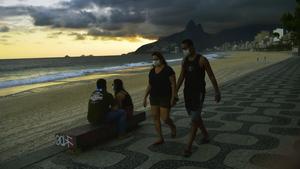 People wear face masks as a preventive measure against the novel coronavirus, as they walk along Ipanema Beach in Rio de Janeiro on May 19, 2020. (CARL DE SOUZA / AFP)
People wear face masks as a preventive measure against the novel coronavirus, as they walk along Ipanema Beach in Rio de Janeiro on May 19, 2020. (CARL DE SOUZA / AFP)
MEXICO CITY / RIO DE JANEIRO / WASHINGTON / OTTAWA / ROME / CAPE TOWN / PARIS / LONDON / TRINIDAD / CAIRO / BERLIN / ATHENS / QUITO / NAIROBI / HELSINKI / MADRID / MOSCOW / KIEV / ACCRA / LUXEMBOURG / ANKARA SAO PAULO - Brazil’s Health Ministry on Wednesday issued new guidelines clearing the way for the use of hydroxychloroquine to treat patients with COVID-19, days after a second health minister in a row quit under pressure from President Jair Bolsonaro.
Under orders of Bolsonaro, the health ministry on Wednesday loosened protocols for the use of chloroquine, indicating it even for mild cases of the virus despite dangerous side effects, experts’ warnings and no demonstrated success in clinical trials.
ALSO READ: Russia overtakes Italy and UK after record rise in virus cases
The president has ordered the military to ramp up production of the drug as he makes it a key element in the anti-virus fight.
The controversy is just the latest twist in Brazil’s erratic strategy to tackle the virus, with Bolsonaro pushing to restart the economy while local authorities try to enforce lockdowns and restrict activities to control it. In the past few days, Brazil has overtaken Spain, Italy and the UK and now trails only Russia and the US in confirmed COVID-19 infections, with more than a quarter million people testing positive and almost 18,000 deaths.
On Tuesday, Brazil reported 17,408 new confirmed cases and 1,179 deaths registered over the past 24 hours - both records.
Russia
Russia's coronavirus case tally, the second highest in the world, passed 300,000 on Wednesday, but the prime minister and a representative from the World Health Organization (WHO) said the situation was starting to stabilize.
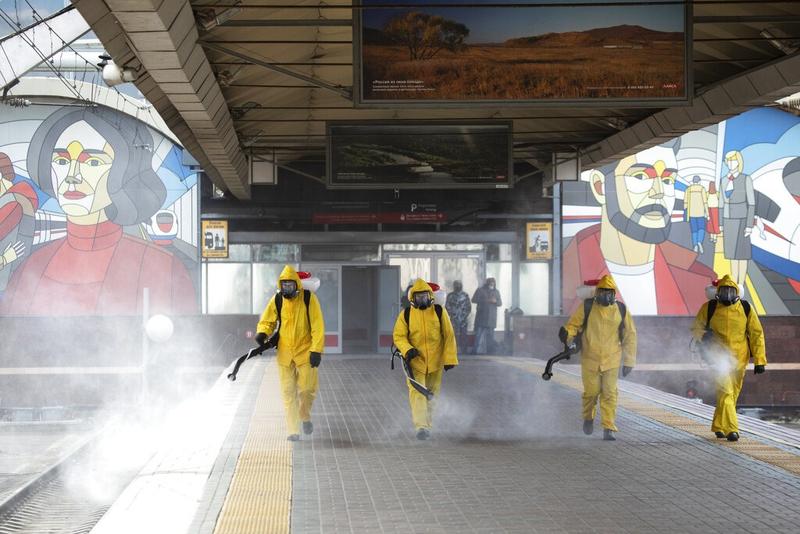 Employees of the Federal State Center for Special Risk Rescue Operations of Russia Emergency Situations disinfect a platform of Leningradsky railway station in Moscow, Russia, May 19, 2020. (PAVEL GOLOVKIN / AP)
Employees of the Federal State Center for Special Risk Rescue Operations of Russia Emergency Situations disinfect a platform of Leningradsky railway station in Moscow, Russia, May 19, 2020. (PAVEL GOLOVKIN / AP)
Russia's 8,764 new novel coronavirus infections took the nationwide total to 308,705. But the daily increase was the lowest since May 1.
The overall death toll edged up to 2,972 on Wednesday, with 135 new fatalities reported in the past 24 hours, the country's coronavirus response center said.
As many as 9,262 people recovered in the same period, bringing the total number of recoveries to 85,392.
Russia's coronavirus outbreak is entering a more stable phase, Prime Minister Mikhail Mishustin said, while warning that restrictions should be lifted carefully in the 17 regions where such moves have been authorized.
Separately, Dr. Melita Vujnovich, the WHO's Russia representative, said that she believed the situation had entered a stabilization phase, the TASS news agency cited her as saying.
In Moscow, Russia's worst hit-region now in its eighth week of a lockdown, citizens remain largely confined to their homes unless they obtain digital passes to make certain journeys. Mayor Sergei Sobyanin said on Tuesday it was too soon to consider letting people out for walks or exercise.
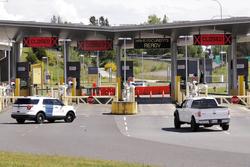 In this photo taken on May 17, 2020, a truck from Canada heads to the single open lane heading into the US at the Peace Arch border crossing in Blaine, Washington. (ELAINE THOMPSON / AP)
In this photo taken on May 17, 2020, a truck from Canada heads to the single open lane heading into the US at the Peace Arch border crossing in Blaine, Washington. (ELAINE THOMPSON / AP)
Luxembourg
Luxembourg began mass testing for COVID-19 this week with the goal of covering all of its 600,000 people as soon as possible to stave off a second wave of infections following the easing of lockdown measures.
The diagnostic tests are voluntary, building up from around 1,500 daily tests to 20,000 a day next month. The aim is to test everyone in the Grand Duchy, in contingents and in some cases several times.
Luxembourg plans to set up to 17 stations to test both citizens and cross-border commuters from Belgium, Germany and France. The country, which has to date reported 109 COVID-19 deaths and 3,958 confirmed cases, does not have any border controls related to the disease.
Ukraine
Ukraine has registered a total of 19,230 COVID-19 cases, 564 deaths and 5,955 recoveries as of Wednesday, the country's health ministry said.
As of Wednesday, 1,376 children and 3,757 health workers have been infected. In the past 24 hours, 354 people have tested positive for the virus.
US, Mexico, Canada border restrictions
The United States, Mexico and Canada said on Tuesday they would extend a ban on non-essential cross-border travel by another 30 days to help fight the coronavirus.
The US Department of Homeland Security said the land-border restrictions, first imposed in mid-March and previously set to expire on Wednesday, would now be extended until June 22 for both Canada and Mexico.
"This is an important decision that will keep people in both of our countries safe," Canadian Prime Minister Justin Trudeau said of the US-Canada measures
The agreement between US and Canada exempts the flow of trade and commerce, as well as healthcare workers such as nurses who live and work on opposite sides of the border. Tourists and cross-border visits remain banned.
"This is an important decision that will keep people in both of our countries safe," Canadian Prime Minister Justin Trudeau said of the US-Canada measures.
ALSO READ: Canada, US extend border restrictions to control virus spread
Mexico's Foreign Ministry confirmed the 30-day extension.
The United States also said on Tuesday it would extend pandemic-related rules that permit rapid deportations of migrants caught at US borders, according to a US Centers for Disease Control and Prevention health emergency order.
As of Tuesday afternoon, there were 79,070 confirmed COVID-19 cases in Canada with over 5,900 deaths, while the United States has more than 1.5 million COVID-19 cases and more than 90,000 people have died of the disease.
Mexico registered 2,713 new cases of the coronavirus on Tuesday, the health ministry said, its biggest daily increase yet in infections, bringing its overall tally to 54,346 cases. Another 334 fatalities were registered, only the second time that the daily death toll has exceeded 300, pushing the death toll to 5,666.
Trudeau emphasized that reopening Canada's border to international travel will be risky as countries worldwide are still working to contain outbreaks and more robust contact tracing has yet to be established.
Meanwhile, US President Donald Trump said he was considering imposing a ban on travel from Brazil.
Global tally
Confirmed COVID-19 cases worldwide has hit 4.9 million and the death toll has surpassed 323,000, according to data compiled by the Center for Systems Science and Engineering (CSSE) at Johns Hopkins University.
The United States is the hardest-hit country, with more than 1.5 million confirmed cases and more than 91,000 deaths, according to the CSSE. Countries with over 200,000 cases also include Russia, Britain, Brazil, Spain and Italy, according to the data.
The number of confirmed COVID-19 positive cases across Africa rose to 88,172 and the death toll surged to 2,835 as of Tuesday afternoon, the Africa Centers for Disease Control and Prevention (Africa CDC) said Tuesday.
Some 33,863 people who have been infected with the COVID-19 have recovered across the continent as of Tuesday afternoon, according to the Africa CDC.
Canada
Schools in Ontario, Canada's most populous province, will remain closed for the rest of the school year through the end of June, due to the COVID-19 pandemic, Premier Doug Ford said on Tuesday.
All provincial schools were shut in mid-March in an effort to contain the new coronavirus, which has killed 1,919 people in the province, according to the latest data.
A detailed plan about how schools will restart in September, including school size, will be announced by end June, Education Minister Stephen Lecce, said.
Ontario on Tuesday allowed some retailers and auto dealers to open their doors to customers after nearly two months of shutdown.
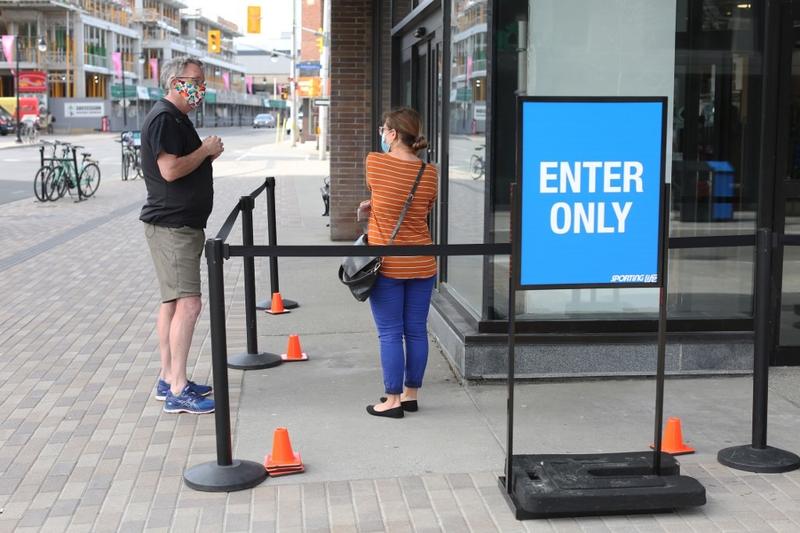 A sporting goods store worker (left) explains shopping rule to a customer. In Ottawa, Canada, May 19, 2020. (DAVE CHAN / AFP)
A sporting goods store worker (left) explains shopping rule to a customer. In Ottawa, Canada, May 19, 2020. (DAVE CHAN / AFP)
US
The region of New York that includes the state capital of Albany has been cleared to reopen on Wednesday after clearing a final hurdle related to contact tracing for the novel coronavirus, Governor Andrew Cuomo said at a daily briefing.
Cuomo also said on Tuesday that the state would allow gatherings of up to 10 people for ceremonies during the upcoming Memorial Day weekend.
Meanwhile, Trump defended his use of the anti-malaria drug hydroxychloroquine as a preventative measure against the coronavirus.
"I think it gives you an additional level of safety," Trump told reporters after attending an event with Republican lawmakers on Capitol Hill. "This is an individual decision to make," he added.
The White House physician, Sean Conley, said in a memo released late on Monday that he and the president had discussed the evidence for and against taking the drug and had agreed that "the potential benefit from treatment outweighed the relative risks."
Cyprus
Cyprus' Council of Ministers on Tuesday began planning for the second stage COVID-19 restrictions easing, government spokesman Kyriakos Kousios said.
Kousios confirmed that elementary schools and gymnasiums will reopen and all restrictions on movement, including a night curfew will end on May 21.
Under the government's plan, people will be allowed to visit relatives and friends and to move freely in parks, squares and marinas as long as they remain in groups of under 10 people.
Restaurants will start receiving customers in open spaces and in groups of less than 10 people, and hairdressers, barbershops, beauty salons, massage and tattoo parlors will also be allowed to reopen.
Religious services in churches, mosques and other places of worship will be allowed as of Saturday, along with weddings and funerals with free attendance.
The reopening of ports, archaeological sites, museums and libraries was put off to June 1.
The new measures were announced as health authorities reported one new COVID-19 case on Tuesday.
Finland
The Finnish government on Tuesday announced restrictions on upcoming reopening of restaurants in June to prevent possible further spread of COVID-19.
Restaurants can reopen only at half capacity, between 6 am and 11 pm, and alcohol service would only be allowed from 9 am until 10 pm, Finnish Family Affairs and Social Services Minister Krista Kiuru said at a government press conference. The rules will cover the whole country now, but regional flexibility will be allowed later.
Meanwhile, 11 students from a school in Mantsala in southern Finland had to be quarantined following exposure to COVID-19 when schools reopened in mid May, the Finnish national broadcaster Yle reported on Tuesday.
The quarantine was ordered after a member of the teaching staff at the school tested positive for COVID-19, according to the Keski-Uusimaa Joint Municipal Authority (Keusote).
To date, five COVID-19 cases have been confirmed among students or school staff since most of Finland's primary and lower secondary schools reopened last Thursday.
According to the Finnish National Institute for Health and Welfare, as of Tuesday afternoon, Finland has confirmed a total of 6,399 COVID-19 cases, with 301 deaths and at least 5,000 recoveries.
France
The French health ministry on Tuesday revised the country's death toll from the novel coronavirus downwards by 217 from 28,239 on Monday, citing "an error of double counting in several nursing homes."
The death toll stands at 28,022 as of Tuesday, the ministry said in a statement.
On May 17, France reported an oddly-high daily death toll of 483, of which hospitals reported another 54 deaths while nursing homes, which represent a third of the country's total fatalities, reported a one-day rise of 429 deaths.
Tuesday's figures from the ministry also showed that 524 people tested positive for COVID-19 in the last 24 hours, taking the total number of infections in France to 143,427.
Hospitalized patients fell by 547 to 18,468, with 1,894 in intensive care units, down by 104 in one day, consolidating an improvement in the sanitary crisis.
Director General for Health Jerome Salomon said that since the lockdown exit on May 11, 50,000 tests have been conducted daily, adding that the testing capacity would be ramped up in the coming days.
READ MORE: EU resolution on pandemic adopted at WHO assembly
Germany
The number of confirmed coronavirus cases in Germany increased by 797 to 176,007, data from the Robert Koch Institute (RKI) for infectious diseases showed on Wednesday.
The reported death toll rose by 83 to 8,090, the tally showed.
Germany’s government may introduce tougher standards for the domestic meat industry after coronavirus hot spots at slaughterhouses prompted reports of inadequate working and hygiene standards.
Chancellor Angela Merkel’s cabinet is discussing the measures this Wednesday, after Labor Minister Hubertus Heil called for a “clean-up” of conditions he said pose “dangerous health risks.” Among the shortcomings that need to be addressed are overcrowded and overpriced living quarters for workers, violations of coronavirus regulations and of minimum-wage legislation, Heil said earlier this week in a statement from his Social Democratic party, or SPD.
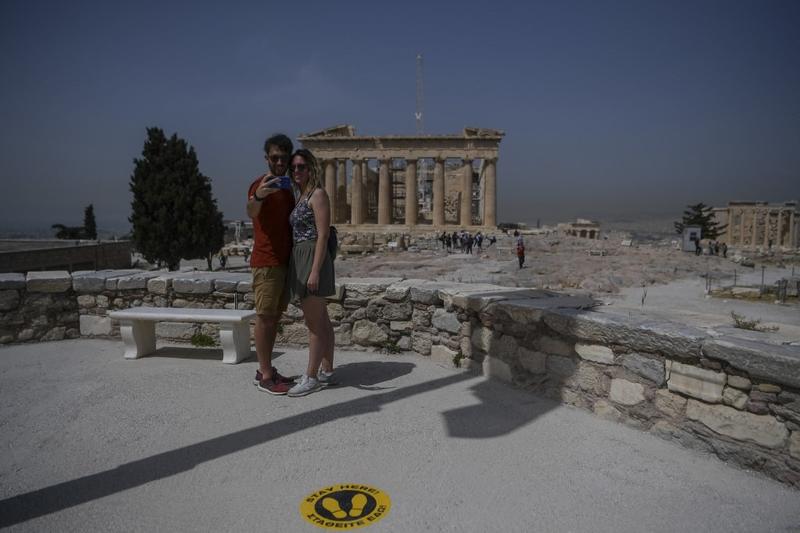 A couple takes a selfie next to a sticker marking safe social distancing. In front of the Parthenon temple on the archeological site of the Acropolis in Athens, Greece, on May 18, 2020. (ARIS MESSINIS / AFP)
A couple takes a selfie next to a sticker marking safe social distancing. In front of the Parthenon temple on the archeological site of the Acropolis in Athens, Greece, on May 18, 2020. (ARIS MESSINIS / AFP)
Greece
Greek authorities will allow travel to and from all its islands starting from May 25, officials announced Tuesday during a regular press briefing.
The decision was made as the gradual rollback of the measures implemented to contain COVID-19 in the country was undergoing well, said Nikos Hardalias, deputy minister for civil protection and crisis management.
Until May 31, a quarantine rule on all arrivals on the limited number of flights landing at Athens International Airport will remain in place, said Hardalias.
Restaurants will open on Monday while hotels are scheduled to follow on June 1. A decision on whether elementary schools will open on June 1 will be announced next Monday, Hardalias said.
Four new confirmed coronavirus cases were registered in the last 24 hours, said a spokesman for the health ministry, raising the country's tally to 2,840. The death toll remains at 165.
Italy
Deaths from the COVID-19 epidemic in Italy climbed by 162 on Tuesday, against 99 the day before, the Civil Protection Agency said, while the daily tally of new cases rose sharply to 813 from 451 on Monday.
The total death toll now stands at 32,169 the agency said, the third highest in the world after those of the United States and Britain.
The number of confirmed cases amounts to 226,699 the sixth highest global tally behind those of the United States, Russia, Spain, Britain and Brazil.
People registered as currently carrying the illness fell to 65,129 from 66,553 the day before.
Netherlands
The Netherlands will start checking all mink farms in the country for the coronavirus after research from an ongoing probe found a person probably caught it from an infected animal.
Screening of mink for antibodies will be mandatory in “the interest of the health of employees,” the Dutch government said in a statement late Tuesday. A farm worker was infected with a strain that was genetically similar to one circulating among mink, suggesting the animals were the source.
The semi-aquatic, carnivorous mammals are raised for their soft pelts on more than 130 Dutch farms. The pandemic virus was probably introduced by an infected person originally. Authorities are monitoring the outbreak to gauge its persistence, said Marion Koopmans, head of the viroscience department at the Erasmus University Medical Center in Rotterdam.
“Does it burn out on the farms? I think that’s the biggest question,” Koopmans, who helped investigate the outbreak, said in an interview. “We would not want to have a persistent situation.”
North Macedonia
The government of North Macedonia will make a big investment in the health sector to strengthen the intensive care departments in order to better cope with a possible second wave of COVID-19, Health Minister Venko Filipce said at a press conference on Tuesday.
The minister said that the government was preparing for a second wave in autumn in consultation with the World Health Organization (WHO) and other countries.
According to Filipce, all intensive care departments will have modern medical equipment, ventilators, digital X-ray devices, beds and other equipment needed for health protection.
Twenty-two new coronavirus cases were registered over the last 24 hours in North Macedonia, the health authorities reported.
As of Tuesday, the total number of confirmed cases in North Macedonia reached 1,839, with 1,351 recoveries and 106 fatalities.
Poland
Polish schools will most probably remain closed until the end of June, when children start summer holidays, government spokesman Piotr Muller told public radio on Wednesday.
Schools have been closed since March, when Poland confirmed its first case of coronavirus. By May 25, they will start offering day care for the youngest children, although teaching will still be conducted online.
The current school year ends on June 26, followed by a two-month long holiday in July and August.
Romania
Romania has not reached an agreement with Greece, Bulgaria and Serbia to ease travel restrictions among them following a quadrilateral video conference, as the country has a specific epidemic situation and will focus on domestic tourism this year, Romanian Economy Minister Virgil Popescu said on Tuesday.
Romanian Prime Minister Ludovic Orban attended an informal meeting earlier in the day, with his Bulgarian and Greek counterparts and Serbian president, respectively, as the four leaders discussed possible future measures to ease travel restrictions among the four states.
Popescu told local media after the meeting that his country would focus on domestic tourism this year. According to him, Romania would talk about tourism in June, only if the number of infections remained within normal limits this week and next week.
At the video conference,Bulgaria, Greece and Serbia reached an agreement to allow tourists from the three countries to travel without a quarantine period of 14 days, from June 1.
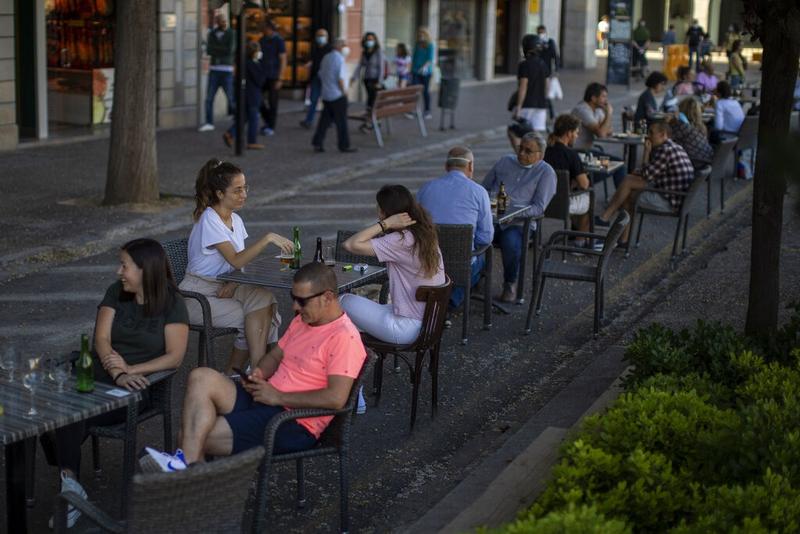 Customers sit at a terrace bar in Girona, Spain, May 18, 2020. (EMILIO MORENATTI / AP)
Customers sit at a terrace bar in Girona, Spain, May 18, 2020. (EMILIO MORENATTI / AP)
Spain
Spain has made it compulsory for all citizens, including children over six, to wear masks in public spaces as one of Europe's strictest lockdowns gradually unwinds.
According to an order by the health ministry, masks would be needed from Thursday for indoor public spaces and outdoors when impossible to keep a two-meter distance.
Spain has suffered 27,778 deaths and had 232,037 cases of the COVID-19 disease, according to latest data. The pace of daily fatalities has slowed to under 100 a day, and Prime Minister Pedro Sanchez's left-wing coalition is aiming to lift most of the lockdown by the end of June unless there is a second wave.
To keep control on the gradual phase-out of restrictions, which vary from region to region, the government is requesting a two-week extension of the state of emergency. The lower house of parliament, where Sanchez needs some opposition support for a majority, was due to vote on that on Wednesday.
Switzerland
Switzerland is extending reserves measures first introduced in March to ensure banks continue lending to businesses and households hit by the COVID-19 pandemic.
Money parked by lenders at the central bank can be excluded from the calculation of commercial banks’ leverage ratios until Jan 1, according to a statement from the Swiss Financial Market Supervisory Authority.
The relief was previously set to expire on July 1. The measures are the latest by Swiss authorities looking to boost credit provisions as business grinds to a halt as a result of the coronavirus.
UK
UK Prime Minister Boris Johnson said the UK will have a track-and-trace system in place by June 1 capable of dealing with 10,000 new coronavirus infections a day.
Johnson has previously said that a system of tracing infections is essential to lifting the UK’s lockdown. Answering questions in Parliament on Wednesday, he didn’t refer to the mobile phone app that the government is developing and which is now overdue, instead focusing on hiring thousands of people to work as contact tracers.
“There will be 25,000 trackers,” Johnson said. “They will be able to cope with 10,000 new cases a day.” He said new infections were currently running at a rate of 2,500 a day.
An effective track and trace system is seen as vital to help persuade teachers’ unions to tell their members to go back to work, allowing schools to reopen next month. Ministers have said they want schools to start to resume classes from as soon as June 1.
READ MORE: UK is first European country with 40,000 virus-linked deaths
Argentina
Argentinian President Alberto Fernandez on Tuesday praised his country's two-month lockdown strategy for effectively containing the spread of the novel coronavirus.
"We Argentinians understood the risk and we had in each governor the leader needed to spur people to stay at home," Fernandez said during a tour of a Volkswagen plant in Tigre, a city on the outskirts of northern Greater Buenos Aires.
Since economies were going to suffer the impact of the pandemic anyway, it was the right thing to do "to prioritize people's lives and health," Fernandez said, indicating Argentina will take a cautious approach to resuming economic activity.
Argentina, which declared a lockdown on March 20, has seen one of the smaller outbreaks in Latin America, with 8,371 cases of infection and 382 deaths by Monday. The lockdown continues until May 24.
Bolivia
Officials in the Bolivian city of Trinidad launched a campaign on Monday to give out free doses of the anti-parasite drug ivermectin in a bid to combat the coronavirus in the country's hard-hit eastern region.
Authorities will go house-to-house to pass out some 350,000 doses of the drug to residents in the region of Beni, where Trinidad is the capital. The area has 581 confirmed cases and 41 coronavirus-related deaths.
"It (ivermectin) is a product that does not have scientific validation in the treatment of the coronavirus," Health Minister Marcelo Navajas told local media. "It does serve to treat parasitic diseases and other types of diseases. Therefore, we ask our medical colleagues who are going to use this product to do so with informed consent."
Ivermectin is used to treat roundworms, threadworms and other parasites. There is also a formulation used to de-worm animals.
Bolivia has more than 4,200 confirmed COVID-19 cases and 174 deaths, according government data.
Colombia
Colombia's mandatory quarantine has been extended by a further week until May 31, President Ivan Duque said on Tuesday, the fourth extension to a lockdown intended to curb the spread of the coronavirus.
The Andean country has nearly 17,000 confirmed cases of coronavirus and more than 600 deaths. It began the quarantine in late March.
A health state of emergency will be extended until Aug 31, Duque added.
Sectors like retail and non-COVID-related medical care can begin normalizing gradually once quarantine ends, Duque said.
Domestic and international flights will not resume yet, nor will inter-municipal travel. Schools and universities will remain closed through July, and people 70 years and older must stay at home through June, Duque said.
Ecuador
Ecuadorian President Lenin Moreno on Tuesday announced steps to cushion the economic impact of the COVID-19 pandemic and subsequent lockdown, which has led to US$12 billion in losses and wiped out 150,000 jobs.
The government will slash public spending by more than US$4 billion, including trimming capital payments on the nation's foreign debt by US$1.3 billion and interest payments on the debt by another US$1.3 billion.
A total of US$750 million will be earmarked to improve the healthcare and welfare systems stretched thin by the pandemic, and more than US$1 billion will be designated to reactivate production.
Government employees will see their work day shortened from eight to six hours, with salaries adjusted to reflect the shorter work week, and many will be able to work remotely to continue social distancing measures and save on public-sector expenses.
Ecuador has reported 33,582 confirmed cases and 2,799 deaths as of Monday, placing it among the hardest hit countries in Latin America, along with Brazil, Peru and Chile.
El Salvador
El Salvador's government on Tuesday extended a strict lockdown until June 6, after President Nayib Bukele threatened to veto a law passed by Congress aimed at accelerating the reopening of the country's economy prior to that date.
The legal minister to the president, Conan Castro, said the order was in line with Bukele's plan to gradually reopen the economy only after another phase of strict quarantine measures to contain the coronavirus.
"The curve has not started to fall, the curve is still rising, and we need to stay in our homes, the only manner we know of around the world to contain the pandemic," Castro told reporters.
The law passed overnight by Congress, with 63 out 84 possible votes, sets out measures for a gradual return to normal in El Salvador, which has imposed some of the toughest lockdown measures in the Americas.
The law was to take effect eight days after its promulgation, but Bukele argued it was too risky to reopen the Central American country so soon, and said on Twitter that it would lead to a massive contagion of Salvadorans if it came into effect.
Nicaragua
Nicaragua's health ministry on Tuesday confirmed a total of 17 people had died in the country from the novel coronavirus, while there were 254 cases in the past week, compared with a previously reported total count of eight deaths and 25 cases.
Health Minister Martha Reyes said on national television that nine people died in the past week, adding to the eight deaths previously reported.
Reyes also said that 199 people had recovered from the coronavirus, but she did not specify the time frame in which they were tested or had been sick.
She also said the majority of people who tested positive for COVID-19 had other diseases, adding that authorities had been able to track the spread of the virus.
Some epidemiologists have warned that the country has yet to see the worst of the pandemic because of the lack of government-ordered health measures, even as President Daniel Ortega declared on Monday that the country had managed to "turn back" the pandemic.
Peru
Peru on Tuesday reported that 99,483 people have tested positive for COVID-19 and 2,914 have died from the disease since the first case was detected two months ago.
Currently, 7,526 COVID-19 patients are being treated at hospitals, with 883 in intensive care units and on ventilators.
Venezuela
Venezuela imposed new curfews in a handful of towns along its borders with Colombia and Brazil in response to a jump in coronavirus cases which officials attributed mainly to returning migrants, Information Minister Jorge Rodriguez said on Tuesday.
In a state television address, Rodriguez said the South American country had detected 131 new cases in the past 24 hours, the most it has registered in a single day to date. He said that included 110 people who had contracted the virus abroad, bringing the total to 749, with 10 deaths.
Millions of Venezuelans have emigrated in recent years due to an economic breakdown and humanitarian crisis, with many settling in nearby Colombia, Ecuador and Peru. But with lockdowns to contain the spread of the coronavirus in those countries now hurting their economies, thousands have returned.
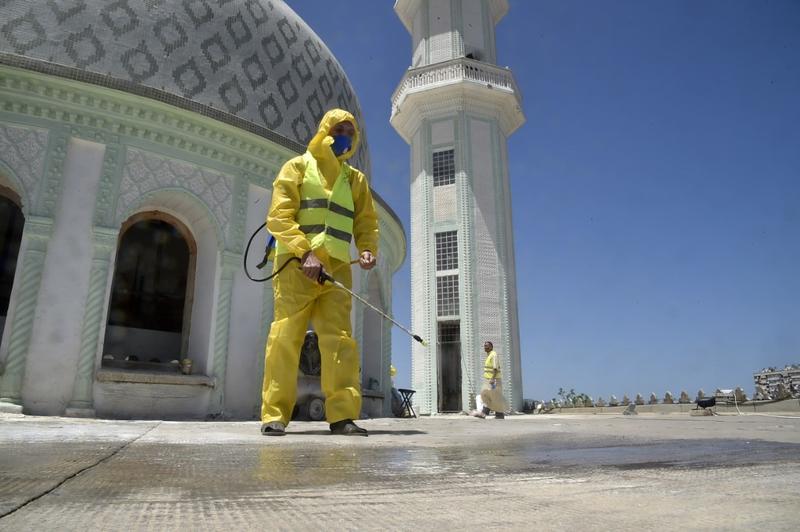 A civil association volunteer in protective gear sprays disinfectant on the roof by the dome of the Abou Hanifa Enouemane mosque in Algiers, capital of Algeria, on May 19, 2020. (RYAD KRAMDI / AFP)
A civil association volunteer in protective gear sprays disinfectant on the roof by the dome of the Abou Hanifa Enouemane mosque in Algiers, capital of Algeria, on May 19, 2020. (RYAD KRAMDI / AFP)
Algeria
The Algerian government on Tuesday said it has tightened restriction measures in a move to contain the spread of COVID-19.
"During the two days of the Eid al-Fitr feast, the lockdown measure will be tightened, as it will be applied from 1 p.m. to 7 a.m.," the Prime Minister Office said in a statement.
Traffic of all vehicles, including motorcycles, will be suspended, according to the statement.
The government also urged people to avoid public gatherings and family visits and reunions during the festival.
The announcement came as Head of the COVID-19 Detection and Follow-up Commission, Djamel Fourar, reported that 176 new cases were registered over the last 24 hours, pushing the country's tally to 7,377.
Egypt
Egypt on Tuesday registered 720 new coronavirus cases, the health ministry said in a statement, its highest daily toll since detecting the first confirmed case in February. The country's former daily record was 535 cases on Monday.
The new cases brought the total infections to 13,484 cases, the ministry added in a statement.
Egypt recorded 14 deaths on Tuesday, according to the statement, raising the total fatalities to 659.
Kenya
Kenya's Ministry of Health on Tuesday confirmed 51 new cases of coronavirus, bringing the national tally to 963.
Mutahi Kagwe, cabinet secretary for health, said 22 more patients have recovered, bringing the total number of recoveries to 358.
No deaths were reported on Tuesday.
Kagwe noted that 15 cases out of the 50 deaths reported so far were household deaths, with the majority from the coastal city of Mombasa.
"So I think we should make it clear that the rising deaths in Mombasa are essentially people dying at home and we want to urge that if a person is unwell, please take them to hospital," said Kagwe.
Libya
The Libyan National Center for Disease Control on Tuesday announced three new COVID-19 cases, bringing the total number of confirmed cases in the country to 68.
A total of 35 recoveries and three deaths have been reported so far, according to the center.
Mauritania
Mauritania on Tuesday reported 50 new COVID-19 cases, bringing the nationwide tally to 131, including four deaths and six recoveries.
Mauritania has experienced a strong surge of confirmed cases in the past few days.
On Sunday, the Mauritanian government decided to prohibit all people from entering and leaving Nouakchott, the epicenter of the pandemic in the country.
Somalia
Somalia's health ministry on Tuesday confirmed 47 new cases of coronavirus, bringing the total tally of infections to 1,502.
Health Minister Fawziya Abikar said another two deaths were recorded, bringing death toll to 59.
She said 15 more patients have recovered, raising the total number of recoveries to 178.
South Africa
The rate of new coronavirus infections in South Africa has to slow before the country can lift a nationwide lockdown in line with WHO guidelines, Health Minister Zweli Mkhize said.
The government’s COVID-19 modeling team on Tuesday presented forecasts showing a peak in active cases in early July under the pessimistic scenario, or a peak in early August under the optimistic scenario.
Active coronavirus cases could peak at 1.2 million in July or 1 million in early August, while the death toll could reach 40,000 to 45,000 by November, according to the modeling team.
Mkhize refuted criticism against the COVID-19 lockdown, saying the measure has effectively stalled the exponential spread of the coronavirus.
As of Tuesday, South Africa has recorded 17,200 confirmed COVID-19 cases, up by 767 from Monday, and 312 deaths, an increase of 26, said Mkhize. The Western Cape remains the epicenter of the pandemic, with 10,639 cases and 187 deaths.
Schools will be allowed to reopen gradually from June 1.
Ghana
The number of COVID-19 cases in Ghana reached 6,096 with 178 new infections confirmed, said the Ghana Health Service (GHS) on Wednesday.
Meanwhile, 19 infected people under treatment have recovered, bringing the number of recoveries to 1,773. The death toll remains at 31, GHS added.
Schools, religious gatherings, funeral and marriage ceremonies as well as conferences have remained suspended in Ghana since March as part of measures to curb the spread of the pandemic.
Uganda
Uganda on Tuesday further eased the COVID-19 lockdown restrictions as the country gradually moves to open up.
President Yoweri Museveni in a televised address said private transport would start operation on May 26 and a maximum of three people will be allowed. Public transport would be allowed on June 4 and passenger service vehicles would only be allowed to carry passengers up to half of their capacities. All passengers are expected to wear face masks.
Museveni said that public and private transportations would still not be allowed in the border districts.
Meanwhile, shops, hotels and restaurants would resume operations on May 26 instead of June 4 as earlier planned, Museveni said.
Education institutions will open on June 4 with only qualified classes allowed to receive students, the president said.
Uganda's ministry of health reported four new confirmed cases of COVID-19, bringing the total number of infections in the country to 264.


